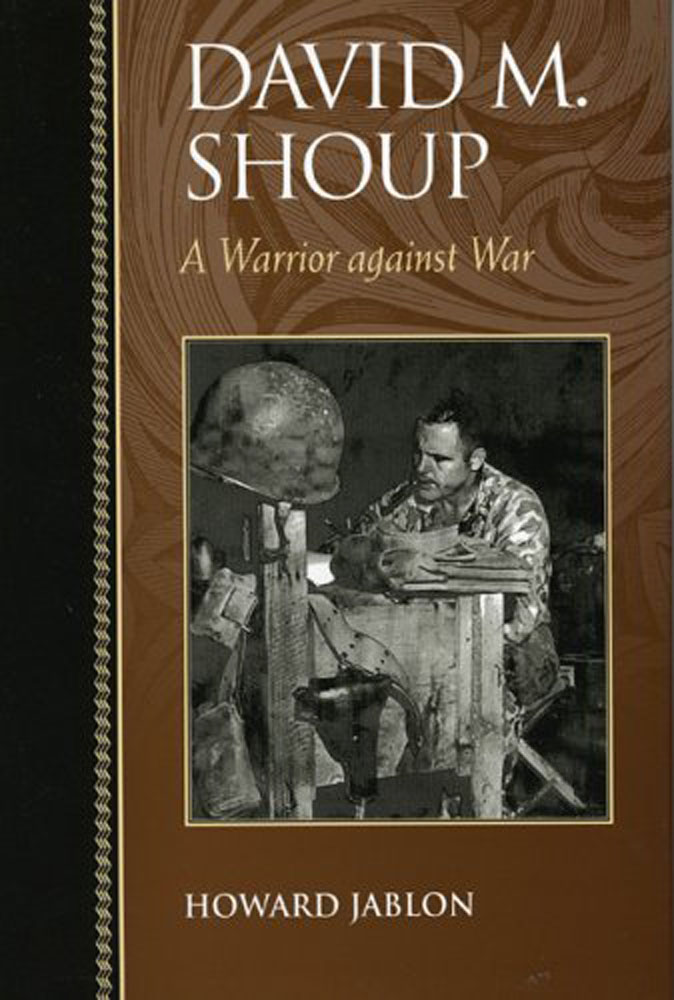 |
A Warrior's VoiceBy Tim Bagwell (Reviewer)
David M. Shoup: A Warrior against War "When the war is over, you pick up your gear, walk down the hill and back into the world, where people smile, congratulate you, and secretly hope you won't be a burden on society now what you've done the dirty work they shun." So wrote Iraq war veteran John Crawford of Tallahassee, Florida in a recent column in the New York Times (Sunday, August 14, 2005, p. 12). Combat veterans of any war—but particularly we of the American war in Vietnam—know exactly the "dirty work" to which Crawford is referring: killing people who are politically inconvenient to one's government. From time immemorial, such dirty work has been the task of soldiers, whether careerists, mercenaries, or draftees. For those of us who have consciously turned our backs on war as legitimate foreign policy, Crawford's words resonate against older and even more resolute statements made by warriors against war.
David M. Shoup, a former commandant of the Marine Corps and a bearer of the Congressional Medal of Honor, is one that particularly comes to mind, as a new biography of him has been written by Howard Jablon, a professor at Purdue University in Indiana. From the perspective of VVAW and other antiwar-veteran organizations, Shoup is best known for the following quotation, voiced in 1966 at Pierce College outside Los Angeles about a year after the antiwar movement arose on U.S. college campuses: "I don't think," he told his audience then, "the whole of Southeast Asia, as related to the present and future safety and freedom of the people of this country, is worth the life or limb of a single American [and] I believe that if we had and would keep our dirty bloody dollar crooked fingers out of the business of these nations so full of depressed exploited people, they will arrive at a solution of their own design and want, that they fight and work for. And if, unfortunately, their revolution must be of the violent type…at least what they get will be their own and not the American style, which they don't want…crammed down their throat" (p. 101). Shoup was not the only ex-general voicing concerns about the Vietnam War, but as Jablon points out so clearly, his battlefield credentials were stunningly impressive at first glance (a former Marine commandant, he was the only recipient of the Congressional Medal of Honor who survived the 72-hour battle of Tarawa in World War II—a battle, by the way, that caused considerable antiwar sentiment in the middle of World War II because of its extremely high American causalities) as were his political connections. The basis of Shoup's antiwar sentiment was twofold: his experiences as a second lieutenant in China in the 1920s, and his later Vietnam-era understanding that the communists in Southeast Asia were never a threat to U.S. national integrity. Writes Jablon about Shoup's lessons in U.S. foreign policy in China in 1927: "Like the peace progressives, he believed the deployment was unjustified and imperialistic. He complained in his journal 'that China has many Americans, or those who propose to be Americans, inhabiting her country and in many cases exploiting her peoples. Yet they claim their right to protection from the U.S. some 10,000 miles away.' Furthermore, he did not believe that protecting American citizens was the reason for the deployment. Shoup shared the view of the Marine commanding general, Smedley Butler, that their true mission was to win a commercial war in China" (p. 18-19). While I remain committed to the sentiment underlying Shoup's antiwar position—a position, by the way, from which he never wavered for the rest of his life—there is much about Shoup that is far too military for me to easily gloss over. "Shoup was not a gentle reformer. His style was abrasive and often cruel" (p. 69). "On one occasion, when an assistant naval attaché…paid a courtesy call on the commandant, he appeared before Shoup wearing dirty and frayed combat ribbons. Shoup yanked the ribbons from his uniform and gave him a severe tongue-lashing" (p. 114). "His MOH from Tarawa was for Marine Corps political reasons for planning and overseeing that island battle; the three other MOH recipients were for battlefield bravery that cost them their lives. In Utmost Savagery: The Three Days of Tarawa, author Joseph Alexander explains that Marine Maj. Gen. Julian C. Smith chose Shoup to receive the MOH over Shoup's XO Merritt ("Red Mike") Edson because Edson "already had a Medal of Honor (from Guadalcanal), (and) Shoup had next to nothing, and it had been on Shoup's broad shoulders that the battle of Tarawa balanced so precariously those first thirty-six hours" (p. 260). Still, Shoup's antiwar voice is truly a permanent landmark for all antiwar veterans as we strive to make this nation less militaristic and more oriented to its espoused ideals.
|


